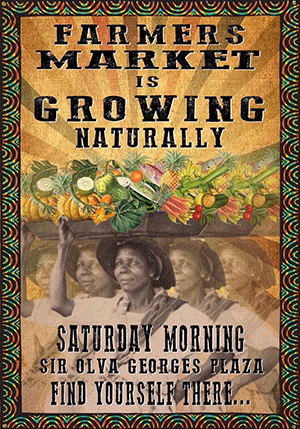Wheatley pumping monthly district budget into agriculture for Virgin Gorda and Anegada

Ninth District Representative Vincent Wheatly has said the majority of the $10,000 sum allocated to his constituency monthly will be going towards agriculture.
From that budget, Wheatley said only the seniors in his district have received their usual monthly allowance to assist with their daily living expenses.
He explained that the remainder of the funds will be used to help the entire Ninth District islands of Anegada and Virgin Gorda to become self-sufficient.
“I get calls every single day. People are ready to go. The metal is hot, it is time to pound the hammer. People are very much interested in agriculture,” Wheatley stated.
Welling programme
He said water availability has been one of the ‘biggest challenges’ for farmers in his district, and he intends to tackle it with a ‘Well Programme’.
He explained that there are a number of old, abandoned wells in his district that he intends to ‘bring back into commission’.
The water from these wells will be at no cost to farmers who would only need to transport the water to their farms, Wheatley stated.
“If you want to do agriculture at a commercial scale using street water, it is not economical,” he reasoned.
Seeds, Seedlings
Still on the topic of agriculture, Wheatley explained that he will be going a step further to assist his constituents with the launch of seeds and seedling bank.
He said persons will be able to donate seeds into the bank by dropping them off at a specified location. If persons prefer seedlings, they can make a request and collect it at no cost.
“I am launching that this week. We need to get more persons planting more food, to eat more local,” Wheatley stated.
Copyright 2025 BVI News, Media Expressions Limited. All Rights Reserved. This material may not be published, broadcast, rewritten or distributed.




















Love this idea…
Great this a great leader
its great, we need boutique farming. this will also give better produce more organically grown.
Lets get the Goats fenced in on the mountain so they dont eat the fruits of peoples hard labor.
the Goats destroy so much on VG when roaming free.we are spending 10 times more than necessary fencing them out rather than fencing them in in designated agricultural areas.
its time to move forward, also to make a prettier island for when tourism resumes.
Tourism is our main livelihood on Virgin Gorda.
@LG I agree with you on the cost of fencing ;but “designated agricultural areas”? When I was a youth there were SUCH areas but alas THIS is no more . Like every where else Urban is encroaching into the woods , look what happen in Oil Nut Bay /Biras / South Sound ( Villas ) Levericks Bay (the late Capt Owen Harrigan told one home owner in Leverick No one told the cows that they had sold the pasture) Long bay ,Mountain Trunk/ Spring / Trunk bay / Baths / Crooks bay/ Copper Mine . These same goats that have become Public Enemy #1(like the cows were until they got rid of ALL in the Valley )will be OUR saving meal for many days to come when the great USA decide NO MEAT export to the Caribbean (V I )
Agriculture may not be as glamorous as medicine, law, engineering, IT……….etc but it feeds a nation. The Coronavirus is a contagious and a deadly disease among other things, tanking economies, increasing unemployment, changing the accustomed ways of our lives and circumstances…….etc. However, in a twisted way what it should have shown VI and its residents was the importance and urgency of a)growing more food, b)importing less food and reducing the food bill and c)enhancing food security.
The VI, albeit with a much smaller population, was relatively self-supporting in food production; it even exported food to its neighbor, the USVI, especially St. Thomas. Today though being self-sufficient in food production will be a Herculean challenge due to a myriad of factors, ie, an increased and increasing population (approx 32,000), limited arable land, using limited arable land for alternative uses (ie, housing), stigmatizing agriculture (working ground) and showing indifference to the land, retiring of older farmers, water source challenges, improving standard of living and quality of life, ready availability of imports……etc.
Moreover, prior to the transition from subsistence agriculture to a service-based economy, ie, tourism and financial services, that fueled the improved standard of living and quality of life, most residents, for the most part, outside of Road Town (capital city)proper, country, and outlying islands cultivated at least a small acreage garden plot. Further, starting during the Colonial era all regional (Anglophone) countries had a central market in their capital cities. They were central fixtures, a cultural norm in all capital cities.
For example, Tortola had a central market that was located at different locations over the years, ie, at the now Sir Olva Georges Plaza, across from the Happy Lion Restaurant on Main St., across from the Methodist Cemetery on Long Bush Rd. and now at a structure in the vicinity of the Round-a-About. Is it operational? Many other regional sister countries still have functional central markets.
The Central Market was a place where farmers, fisherfolks, butchers……..etc met to sell or barter goods. Saturday was market day. Additionally, the Central Market was also a place where people, ie, family, friends ……etc congregate to socialize, catching up on happenings across the territory. Moreover, though the VI may not be self-sufficient in food production it must produce as much food as practical.
Food production is an important regional issue. Suggest reading an article by Daphne Ewing-Chow, a Barbadian writer: “Five Overlooked Facts about Caribbean Food Security” that was published on Feb 20 in Forbes magazine.
?? to the Hon Wheatley for helping to promote agricultural production.
“Suggest reading an article by Daphne Ewing-Chow, a Barbadian writer: “Five Overlooked Facts about Caribbean Food Security” that was published on Feb 20 in Forbes magazine.” Indeed, a good read. The Latin phrase at the bottom of the VI coat of arms says Vigilate (be vigilant). The VI must be vigilant about its food supply, producing as much local food as possible.
The value of this practice is priceless, ie, it reduces the food import bill, improves the quality of food supply and enhances the food security. For years, government officials have been flapping their gumbs about producing more food locally but nothing substantially happened. As long as the super markets shelves were laden with processed foods with high calories, fat, sugars and sodium all was/is well. The article by Daphne Ewing-Chow indicates that Caribbean people are the most obese in the Americas and that 3 of 4 die from non-communicable diseases.
At one time, VI residents had an active life style; they walked everywhere, ie, church, school, work….etc. Now, they jump in their expensive foreign cars (well, there are no locally made cars. My bad) and drive everywhere. My people, we need to watch our diet (throw in a salad or two regularly) and get in the habit of seriously exercising regularly. We are too damn fat, our diet is killing us. I’m guilty too! Watch good is the BIGS if we killing ourselves prematurely. As the late Norbert “Fix It” Wheatley use to say, “Fix yourself.” He is gone but he left us some priceless advice.
Yes Elton -the Farmers and Fisherman’s market was the core – the essential social anchor space that kept the BVI people stable, productive, healthy … and loving for more than 150 years from the demise of plantation slavery (1820’s)to the rise of tourism and banking (1960’s).
This core is not dead ! No matter what some might say….and judging by the amount of people that are instinctively returning their attention to growing food – the next Farmers Market we hold will be a busy place ! Watch this space…
The only reason “agriculture is less glamorous”, which is a ridiculous thing to say because jobs aren’t glamorous to begin with, is because people say silly things like “agriculture is less glamorous”. There’s nothing glamorous about one person’s work that elevates them above another. You need the farmers as much as the cashier who sells produce to you, or the truck driver that takes it from point A to B. These “glamorous” Doctors, lawyers, and elected officials need to be fed. The only reason people associate “glamorous” with a specific field is the PAYCHECK. The work of a lawyer or doctor isn’t glamorous, it just pays better. The key is to assign correct value to work being performed. If a man helps to feed a nation, or just himself, is his work not as critical to life as the doctor? You won’t get far not eating. Farmers, cooks, teachers, plumbers, etc …. ALL are essential to the function of a modern world. All of them would rather stay home no matter how “glamorous”. The notion of jobs being more glamorous has got to change or the working poor and disadvantaged of the world haven’t a chance. Glamorous isn’t important, dignity is important. And there is dignity to ALL work. Now strupes on couches doing nothing is another story lol.
I thought the other Wheatley was the agriculture minister.
Did Andrew give it to the wrong one?
An interesting read:https://www.forbes.com/sites/daphneewingchow/2019/02/20/five-facts-about-caribbean-food-security/